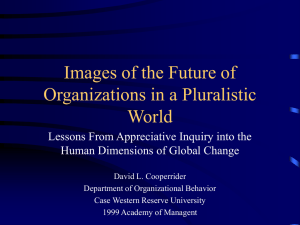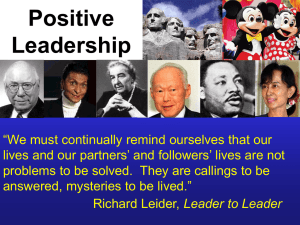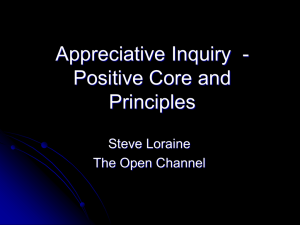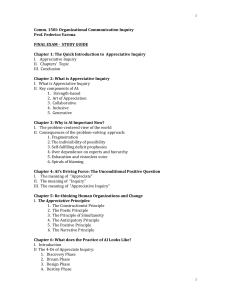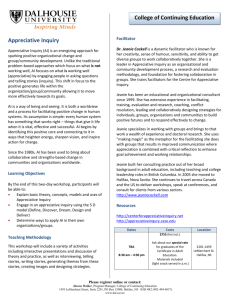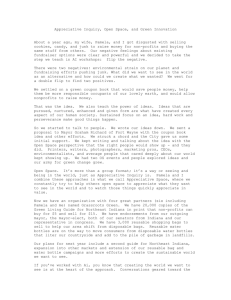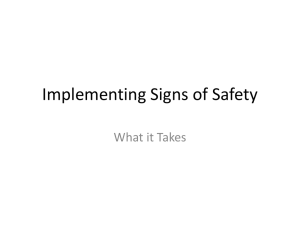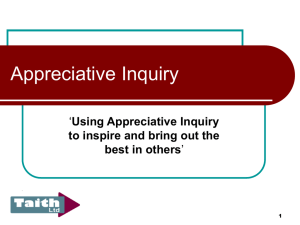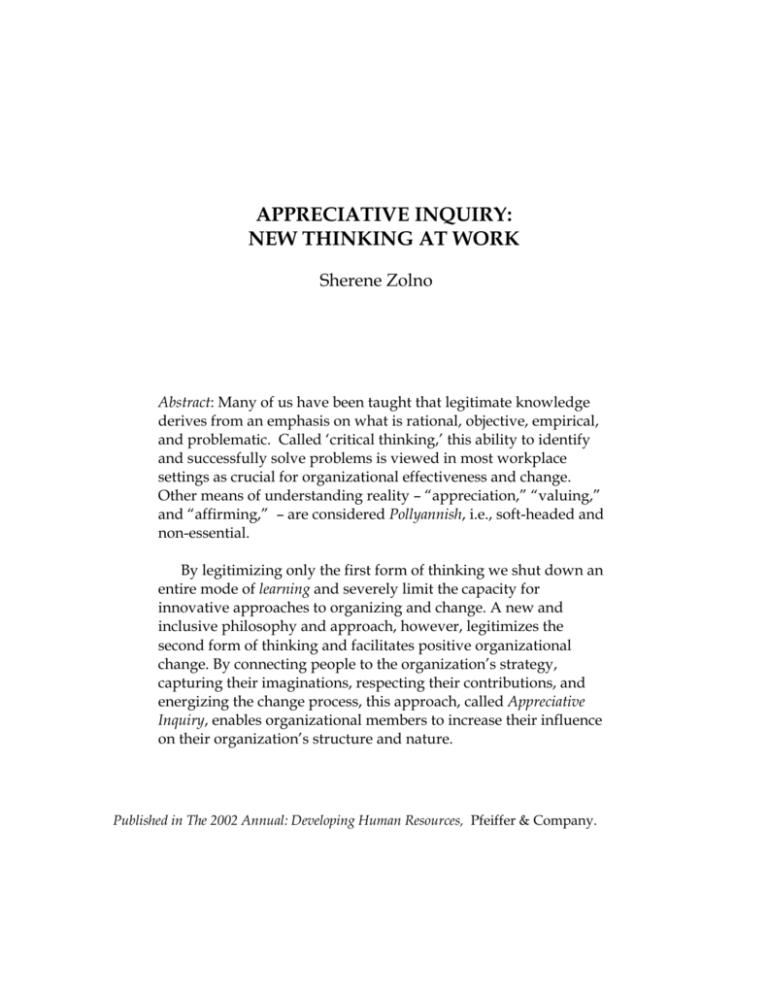
APPRECIATIVE INQUIRY:
NEW THINKING AT WORK
Sherene Zolno
Abstract: Many of us have been taught that legitimate knowledge
derives from an emphasis on what is rational, objective, empirical,
and problematic. Called ‘critical thinking,’ this ability to identify
and successfully solve problems is viewed in most workplace
settings as crucial for organizational effectiveness and change.
Other means of understanding reality – “appreciation,” “valuing,”
and “affirming,” – are considered Pollyannish, i.e., soft-headed and
non-essential.
By legitimizing only the first form of thinking we shut down an
entire mode of learning and severely limit the capacity for
innovative approaches to organizing and change. A new and
inclusive philosophy and approach, however, legitimizes the
second form of thinking and facilitates positive organizational
change. By connecting people to the organization’s strategy,
capturing their imaginations, respecting their contributions, and
energizing the change process, this approach, called Appreciative
Inquiry, enables organizational members to increase their influence
on their organization’s structure and nature.
Published in The 2002 Annual: Developing Human Resources, Pfeiffer & Company.
WHAT IS APPRECIATIVE INQUIRY?
David Kolb (1984), in his theory of experiential learning, describes the importance of
both appreciative apprehension and critical comprehension as different processes of
knowing. Critical comprehension is based on skepticism and doubt, while appreciative
apprehension is based on belief, trust and conviction.
One mistake we make is to define “appreciative” in a limited way as meaning
only “gratitude.” Appreciative also includes the meanings “to see” (where you pay
attention), “to value” and “to increase in value.” When Kolb says, “Appreciation is the
process of valuing,” he is reminding us that it takes more than just the facts to make
effective choices about the world.
“Appreciation of an apprehended moment is a judgment of both value and fact.
To appreciate apprehended reality is to embrace it. And from this affirmative
embrace flows a deeper fullness and richness of experience.”
–David Kolb1
David Cooperrider (Srivastva & Cooperrider, 1990), of Case Western Reserve
University, who is one of the original developers of Appreciative Inquiry, describes it as
engaging people in “...an inquiry process that tries to apprehend the factors that give
life to a living system.” Based on information derived from the inquiry, people would
then “seek to articulate those possibilities that can lead to a better future.”2 The
Appreciative Inquiry process as he has presented it, is about finding ways to
successfully translate best intentions into reality, and values and beliefs into practice.
“It is important to recognize that the problem-solving method of organizational
inquiry quite systematically paints a picture of organizational life in which a
whole series of colors are considered untouchable. In this way, the totality of
being is obviously obscured, leading to a narrowed conception of human nature
and cultural possibility.”
–David Cooperrider and Suresh Srivastva2
__________________________________________________________________________
1 Reprinted from D.A. Kolb, Experiential Learning: Experience as the Source of Learning and Development, copyright 1984, with
permission from Prentice-Hall.
In other words, the expected outcome of the Appreciative Inquiry is an organization
which has affirmed its strengths and fundamental values, used that information to
engage in a process to envision a collectively desired future, and moved forward
towards enacting that vision in daily worklife.
PROBLEM SOLVING VS. APPRECIATIVE INQUIRY
Because it is highly counter-intuitive in Western culture, it’s difficult to understand how
affirming strengths and values can lead to transformational change. In fact, most
leaders would feel remiss if they failed to engage in a rational process using problemsolving methods to identify ways to improve the cost effectiveness of internal systems.
We need to question, however, whether problem solving has already fixed that which is
solvable, and begin to focus on what is yet possible – the untapped potential beyond
fixing what’s already in place.
Carl Jung, early 20th Century psychological researcher and therapist, noticed
that a person’s problems faded when they were confronted with a new or stronger
interest. He asserted that the greatest and most important problems in life were
fundamentally unsolvable and could only be outgrown (Jung 1923).
For Jung, Cooperrider and others, problem solving appeared inherently
conservative, limiting and slow. The philosophy and approach they sought to
introduce instead focused on the future of the system as a whole, on engaging
participants in collectively imagining new possibilities for their future, and on
bypassing the process of solving yesterday’s problems.
Thomas White, President of GTE Telephone Operations, expressed his concerns
with the limits of problem solving by asking this question: “Should we demoralize a
successful group by concentrating on their failures, or help them over the remaining
hurdles by building a bridge with their successes?” He felt that using Appreciative
Inquiry helped GTE attain much better results than just trying to fix problems – that by
shifting their internal conversation away from its focus on negative problems and
toward valuing their capabilities, the re-energized organization improved financial
results beyond what was expected with traditional problem solving alone (White, 1996).
“We are among the best problem solvers in the world. We trouble shoot
everything. When used continually and over a long period of time, however, this
approach can lead to a negative culture. If you combine a negative culture with all
the challenges we face today, it could be easy to convince ourselves that we have
too many problems to overcome––to slip into a paralyzing sense of hopelessness.”
–Thomas White
President, GTE Telephone Operations
2 Reprinted from W.A. Passmore and R. W. Woodman, Research in Organizational Change and Development, copyright 1987,
with permission from Elsevier Science.
Table 1 Problem Solving vs. Appreciative Inquiry
PROBLEM SOLVING
APPRECIATIVE INQUIRY
Identification of the problem
Analysis of Causes
“What’s going on”
Inquiry: Discovery Phase
“Valuing the best of what is”
Proposed Solutions
“Fix the problem at hand”
Action Planning
“How to get it done”
Action
“Fix the problem”
Setting a context of appreciation of
(seeing) what is
Envisioning: Dream Phase
“What might be”
Dialoguing/Aligning: Design Phase
“This is what will be”
Innovating: Destiny Phase
“Creating and sustaining it now”
BASIC ASSUMPTIONS . . .
Problem Solving:
That the organization is
a problem to be solved
Appreciative Inquiry:
That the organization is
a mystery to be embraced.
Table 1 identifies some of the differences between problem solving, and Appreciative
Inquiry.
As many organizational leaders are far from achieving the results they
want, the need to reinvent the tools used in helping them is clear. The choice
appears to be to stay in the incremental problem based, diagnosis/treatment
frame, or to move on to a fresh perspective which can simultaneously address
the compelling triad of strategy, structure and culture during change.
The Appreciative Inquiry process makes available a whole new array of
alternatives to support organizational learning and expand possibilities for
action. Using it, change leaders have an opportunity to reframe their
philosophical stance in a fundamental way–– that is, during organizational
improvement efforts, to be deliberately appreciative. They would thus be working
with optimism and hope, actively
engaged in valuing and celebrating the human spirit, while creating an
enspirited environment welcoming to creativity and imagination.
________________________________________________________________________
Reprinted with permission of the publisher. From Appreciative Inquiry,
copyright 1999 by D. L. Cooperrider and D. Whitney, Berrett-Koehler
Publishers, Inc. San Francisco, CA. All rights reserved.
References
Cooperrider, D.L. & Whitney, D. (1999). Appreciative Inquiry. San Francisco, CA: Berrett-Koehler
Kolb, D.A. (1984). Experiential learning: Experience as the source of learning and development.
Englewood Cliffs, NJ: Prentice-Hall.
Jung, C.G. (1923). Psychological Types, London: Routledge & Kegan Paul.
Srivastva, S., & Cooperrider, D. L. (1987). “Appreciative Inquiry into Organizational Life,” in
W.A. Pasmore and R.W. Woodman (edS.) Research in Organizational Change and Development. (Vol.
1). Stamford CT: JAI Press.
Srivastva, S., & Cooperrider, D. L.(1990). Appreciative Management and Leadership, San Francisco,
CA: Jossey-Bass.
White, Thomas H.(1996) Vital Speeches of the Day,. Newark, NJ: City News Publishing Company.
Sherene Zolno, RODC, executive director of The Leading Clinic, is a
researcher, educator and consultant whose expertise includes working with
leadership teams to ready them for the future, and assisting organizations in
identifying strategic intentions, improving operations and transforming
culture. Her research-based New Century Leadership™ program and Timeline
for Tomorrow process are the foundation for systems change in several major
organizations.
Ms. Zolno served on ASTD’s OD Professional Practice Area board. Her writing
has been published in ASTD’s Research Monograph and OD Network’s
VisionAction Journal, in Jossey-Bass/Pfeiffer’s 2000 Annual, as well as in
numerous other professional publications.
You can reach her at: coachpb@comcast.net

